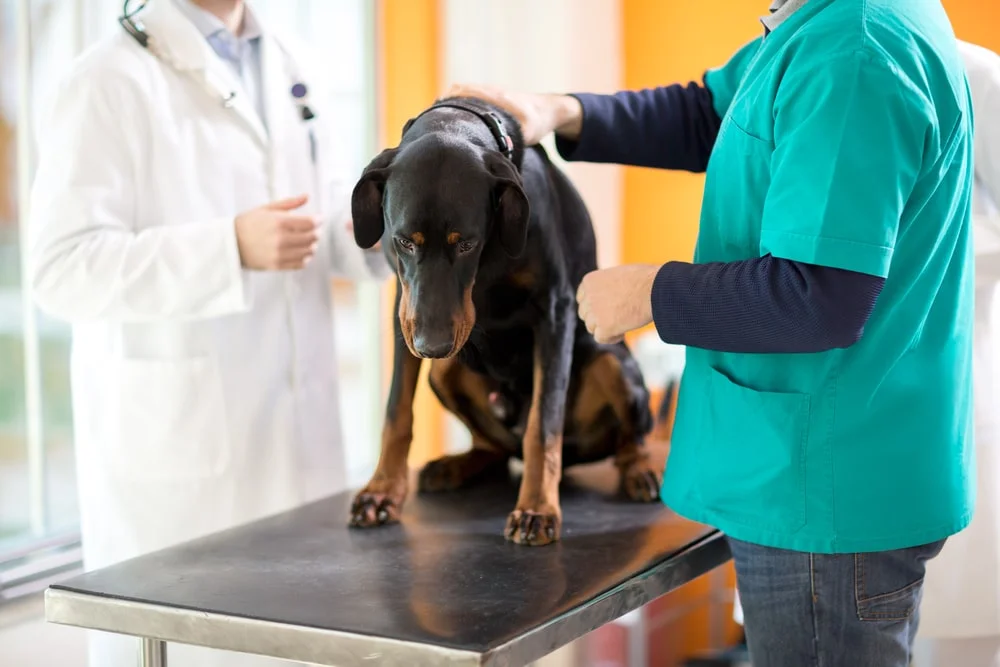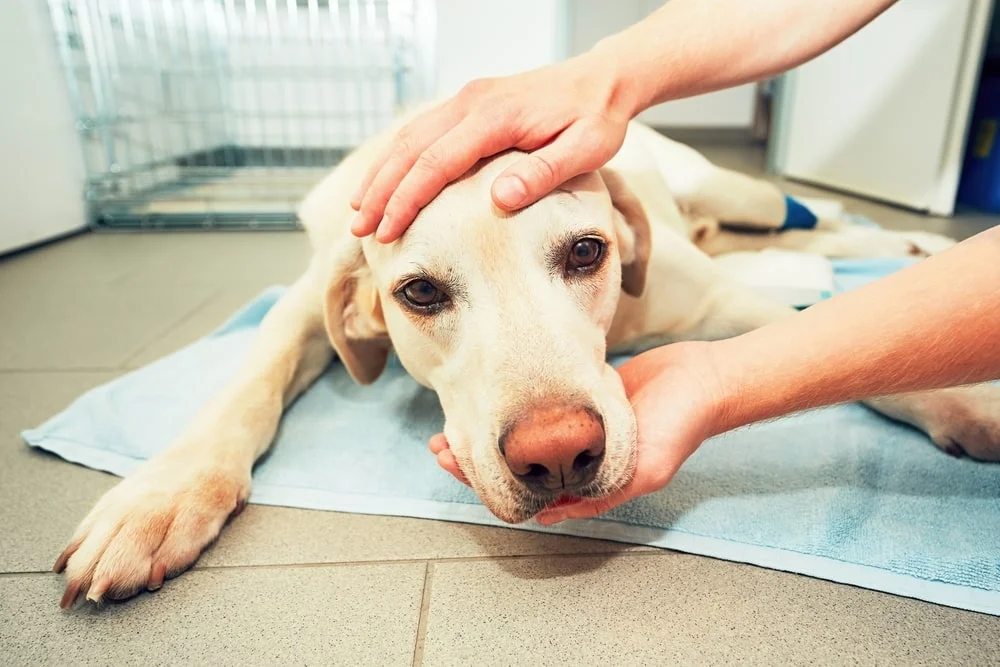PET HEALTH
The cost of chemotherapy for dogs ranges from $150 – $600 per dose, according to the Veterinary Cancer Society.1 Treatment often requires multiple rounds of chemo, which can add up quickly for pet parents.
The American Veterinary Medical Association (AMVAⓇ) found that about 1 in 4 dogs develop neoplasia — abnormal cell or tissue growth that leads to tumors — at some point in their life, and nearly half of dogs over the age of 10 develop cancer.2
Chemotherapy uses chemicals to target cells and stop their growth. Your vet can help you determine if this option is right for your dog, but understanding the costs can help you feel more prepared.
Pet Insurance May Help Cover Cancer Costs
How Much Is Chemo for Dogs in Total?
Chemotherapy for dogs usually costs between $150 and $600 per dose.1 Since dogs often need multiple doses over several months or even years, the total cost of chemo for dogs can add up to several thousand dollars.3
The cost for chemotherapy depends on many different factors, like the number of chemo sessions and the types of drugs used. Some other fees you might see will depend on the provider and can include oncologists, veterinary hospitals, or visits to other clinics.1 In each case, the fees may vary quite a bit.
You can call the office you’re taking your dog to and ask them directly about the specific costs of dog chemotherapy and other fees involved with your visit and your dog’s ongoing cancer treatment.
Factors That Affect the Cost of Chemo for Dogs
The chemotherapy costs for your dog can vary widely depending on several factors. Some of the more common factors that influence your dog’s cancer treatment costs include the following:1,2,3
- Type of cancer: Some cancers in dogs require more aggressive or specialized treatment, which can drive up chemo costs. Common cancers, like lymphoma, may have more standard treatment plans, while rarer cancers can be more expensive to treat.
- Cancer stage and diagnosis: The grade and stage of the cancer both play a role in establishing the right treatment option. Tests like biopsies, ultrasounds, and scans are often needed to assess how far the cancer has spread, which can affect the overall cost.
- Size of the dog: Larger dogs often need higher doses of medication, which can increase the cost of each treatment session compared to smaller dogs.
- Pre-treatment health exams: Before chemo begins, vets usually run blood tests and other screenings to make sure your dog is healthy enough for treatment. These health checks add to the cost but are essential for safe treatment.
- Number of chemo treatments needed: The number of chemotherapy sessions depends on how your dog’s cancer responds to treatment. Some dogs may need treatments more often than others, which can increase the overall cost.
- Vet location and level of expertise: The cost of chemo treatments can vary based on the location of the vet clinic and the veterinary oncologist’s experience level. Clinics in areas with higher costs of living or specialty hospitals may charge more for their services.
- Type of chemotherapy drugs and administration: Dog chemotherapy costs also depend on the specific medications used and whether they’re given to your dog orally, by an intravenous (IV) injection, or by an injection right into the cancerous tumor.
Discuss these factors with your vet to get a clearer picture of the overall cost of your dog’s chemotherapy treatments. They can also help you understand what to expect moving through the process.
When Do Vets Use Chemotherapy?
Vets often use chemotherapy when there’s a risk of the cancer spreading in your pet or if there are already extensive tumors.4
In most cases, chemo treatments begin after a dog goes through surgery to target any cancerous cells the surgery didn’t remove. In other cases, chemotherapy is used prior to surgery to shrink a tumor and make surgery safer or easier.4
The length of time your dog will need chemotherapy will vary depending on the stage of the cancer and numerous other factors. Some dogs receive chemo for the remainder of their lives.3
How Is Dog Chemotherapy Administered?
Your dog can receive chemotherapy in many ways. The course of treatment is based on the drug that’s being used and the dosing schedule your dog’s doctor has recommended.
Chemotherapy can be given orally via a pill you can feed to your dog at home. It can also be given as an injection at a veterinarian’s office.3,4
There are also metronomic protocols to deliver chemotherapy, where low doses are given in equally spaced time increments. This means your dog could receive chemo daily or every other day. Metronomic protocols may decrease a tumor’s ability to create new blood vessels.4
Your veterinary oncologist or regular vet will help you decide which chemotherapy method is the best option.
How Often Do Dogs Need Chemotherapy?
There’s no one-size-fits-all approach to a dog’s chemotherapy protocol.3 Instead, the frequency of your dog’s chemo treatments will depend on which type of cancer they have and how they tolerate it in terms of side effects.
Your dog could receive chemotherapy every day, once a week, or every few weeks. The time between doses is completely individualized, as well. Some dogs receive chemo in cycles, which allows their bodies to rest between treatments.3,4
What Are the Side Effects of Chemo in Dogs?
Most side effects of chemotherapy affect the dog’s gastrointestinal tract and bone marrow. Common side effects include:3,4
- Nausea
- Vomiting
- Loss of appetite
- Diarrhea
- Weakened immune system (due to decreased white blood cells)
- Changes to their coat
A silver lining is that the majority of dogs undergoing chemotherapy have minimal to no side effects. In fact, 80% – 85% of pets experience little to no side effects, while only about 20% – 25% may have mild to moderate reactions to the chemo treatments.3,4
FAQs About Chemotherapy for Dogs
You might still have some questions about chemotherapy for dogs. We’ve got you covered.
Is dog chemotherapy worth it?
Chemotherapy can offer the chance to prolong your dog’s life and improve their quality of life after a cancer diagnosis. While there are no guarantees, many dogs respond well to treatment with minimal side effects.3,4 When deciding whether chemo is right for your dog, consider factors like the potential benefits, cost, and your dog’s overall health.
Your veterinary specialist can guide you through the process and help you make the best decision for your dog.
What’s the success rate for dogs after chemo?
While success rates depend on the type and stage of cancer, chemotherapy has proven to be effective for many dogs. In many cases of canine lymphoma, which is the most common cancer, remission rates are usually around 80% – 90%, with an average remission lasting 9 – 10 months.5
Are there alternatives to dog chemotherapy?
Yes, radiation and surgery are common alternatives to chemotherapy and are often used alongside it. Radiation therapy, or X-ray therapy, targets and kills cancer cells, which divide more rapidly than healthy cells. Surgery, on the other hand, removes cancerous cells or tumors and is often the most effective treatment for many types of cancer in dogs.6
Pet Insurance Can Help With Dog Cancer Treatment Costs
Facing a cancer diagnosis for your dog is difficult, and the cost of chemo for dogs — including consultations, medications, and treatments — can add up quickly. A MetLife Pet Insurance policy may help you cover expenses, like vet visits and medications.
For example, when Chevy was diagnosed with lymphoma, her family was reimbursed nearly $490 of the $615 bill for one of her exams. This support allowed them to focus on Chevy’s care without the added financial stress.7
Get a free quote today to see if a dog insurance policy is the right option for you while you focus on your pup’s well-being.



